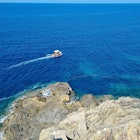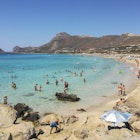
Nov 8, 2024 • 6 min read
The greatest seaside escapes are usually the ones that nobody else knows about: the ones down the mile-long sandy trail, the ones at the bottom of the rickety steps, the ones you have to inflate a dinghy and paddle to.
But even the most well-known places can feel intimate if you time it right. Plan a trip to one of these European seaside escapes in September or October (when the weather is still good and the crowds dwindle) and you’ll see just why we love them.
1. Cinque Terre, Italy: Rooted in antiquity, Cinque Terre’s five towns date from the early medieval period and barely anything about these five crazily constructed Ligurian villages has changed in over three centuries. Buildings aside, Cinque Terre’s most unique historical feature is the steeply terraced cliffs bisected by a complicated system of fields and gardens that has been shaped over the course of nearly two millennia. The most accessible village by car and the only Cinque Terre settlement to sport a tourist beach is Monterosso, which is the furthest west and least quintessential of the quintet (it was briefly ditched from the group in the 1940s). Guarding the only secure landing point on the Cinque Terre coast, Vernazza is the quaintest of the five villages. Its tiny harbour is framed by the Chiesa di Santa Margherita, while the ruins of an 11th-century castle look out to sea.
2. Santorini, Greece: Even the most jaded traveler succumbs to the spectacle of Santorini's surreal landscape and dramatic sunsets. The startling sight of the submerged caldera, almost encircled by sheer lava-layered cliffs and topped by a dusting of towns, should not be missed. The village of Oia on the northern tip of the island offers excellent, unobstructed sunset viewing and the east side of the island has black-sand beaches at popular resorts such as Kamari and Perissa.
3. San Sebastian, Spain: The coast road from Bilbao to San Sebastián is a glorious journey past spectacular seascapes, with cove after cove stretching east and verdant fields suddenly ending where cliffs plunge into the sea. Casas rurales (village or farmstead accommodation) and camping grounds are plentiful and well signposted. The tiny hamlet of Elantxobe, with its colourful houses clasping to an almost sheer cliff face, is undeniably one of the most attractive spots along the entire coast. It’s impossible to lay eyes on San Sebastián and not fall madly in love. For its setting, form and attitude, Playa de la Concha is the equal of any city beach in Europe.
4. Corsica, France: Crowned by saw tooth peaks, mantled in forest cloaks of green oak, chestnut and pine, and shot through with rushing rivers and tumbling cascades, Corsica is one of the most dramatic, diverse and downright gorgeous islands in the Mediterranean. Fine stretches of sand can be found at Spérone and around the Golfe de Sant’Amanza. Best of all is the horseshoe bay of Rondinara and tree-fringed Palombaggia, which you’ll see gracing postcards all over Corsica. You couldn’t leave without exploring the waters around Bonifacio – thought by some scholars to have featured in Homer’s Odyssey. The largest (and most visited) island of the group, Île Lavezzi is known for its natural pools, deserted beaches and swimming holes.
5. Kvarner Gulf, Croatia: Protected by soaring mountains, covered with luxuriant forests, lined with beaches and dotted with islands, the Kvarner Gulf is home to four of our top Croatian beaches. At the southern end of Krk Island, Baška has the island’s most beautiful beach, a 2km-long crescent set below a dramatic, barren range of mountains. Cres Island is home to beaches and crystal-clear coves at Lubenice, accessible by a steep path through the underbrush, and Beli. Finally, Paradise Beach on Rab Island is a sandy stunner with shallow waters and the shade of pine trees.
6. Amalfi Coast, Italy: Stretching about 50km along the southern side of the Sorrentine Peninsula, the Amalfi is one of Europe’s most breathtaking. Cliffs terraced with scented lemon groves sheer down into sparkling seas; sherbet-hued villas cling precariously to unforgiving slopes while sea and sky merge in one vast blue horizon. The pearl in the pack, Positano is the coast’s most photogenic and expensive town. An early visitor, John Steinbeck wrote in 1953: ‘Positano bites deep. It is a dream place that isn’t quite real when you are there and becomes beckoningly real after you have gone.’ More than 50 years on, his words still ring true.
7. Côte d’Azur, France: With its glistening seas and charming, tangled old-town streets foreigners have admired the Côte d’Azur for centuries. Also known as the French Riviera due to a string of influential sojourners from Queen Victoria to F. Scott Fitzgerald this lustrous stretch of shoreline is still attractive to those seeking mild winters and hedonistic lifestyles. But away from the spotlight of Cannes and St-Tropez, the coastal roads between Nice and Monaco offer some of the most spectacular scenery. The terracotta-roofed fishing port of Villefranche-Sur-Mer was a favourite with Jean Cocteau, who painted the frescoes in the 17th-century Chapelle St-Pierre. Steps split the steep cobblestone streets that weave through the old town. Beyond the port is a sandy beach offering picture-perfect views of the town.
8. Menorca, Spain: Menorca is the least overrun and most tranquil of the Balearics. The untouched beaches, coves and ravines around its coastline allow the more adventurous the occasional sense of discovery! The north coast is rugged and rocky, dotted with small and scenic coves. It’s less developed than the south and, with your own transport and a bit of legwork you’ll discover some of the Balearics’ best off-the-beaten-track beaches. Platja Cavalleria is a fabulous double-crescent, golden beach.
9. Curonian Spit, Lithuania: This 98km lick of sand is a wondrous mixture of dunes (some as high as 200m) and forest – the smell of pine will impart an otherworldly quality to your hammock time. Wilhelm von Humboldt believed that a trip to the Curonian Spit was essential nourishment for the soul, and Thomas Mann was also drawn to this timeless wonderland. It’s said that around 14 villages are buried under the endless, shifting dunes, making the Spit a kind of Baltic Sahara. The towering 52m ‘Great Dune’ is in Nida; to get there take the ferry from Klaipeda to Neringa (costs around €10 per car), then drive or cycle 50km.
10. England’s Victorian seaside towns: While England’s weather can’t compete with the Mediterranean there are two great seaside escapes just over an hour from London that can. An hour’s train ride east of London is the Victorian seaside town of Broadstairs. Charles Dickens wrote a few of his books in the cliff-top house overlooking Viking Bay. Grab an ice-cream at Morelli’s and wander down the broad stairs to the beach. An hour’s train ride south of London is Brighton, the most vibrant seaside resort in England. Brighton has embraced the outlandish ever since the Prince Regent built his party palace here in the 19th century.
This article was updated in February 2012.


Nov 8, 2024 • 6 min read







